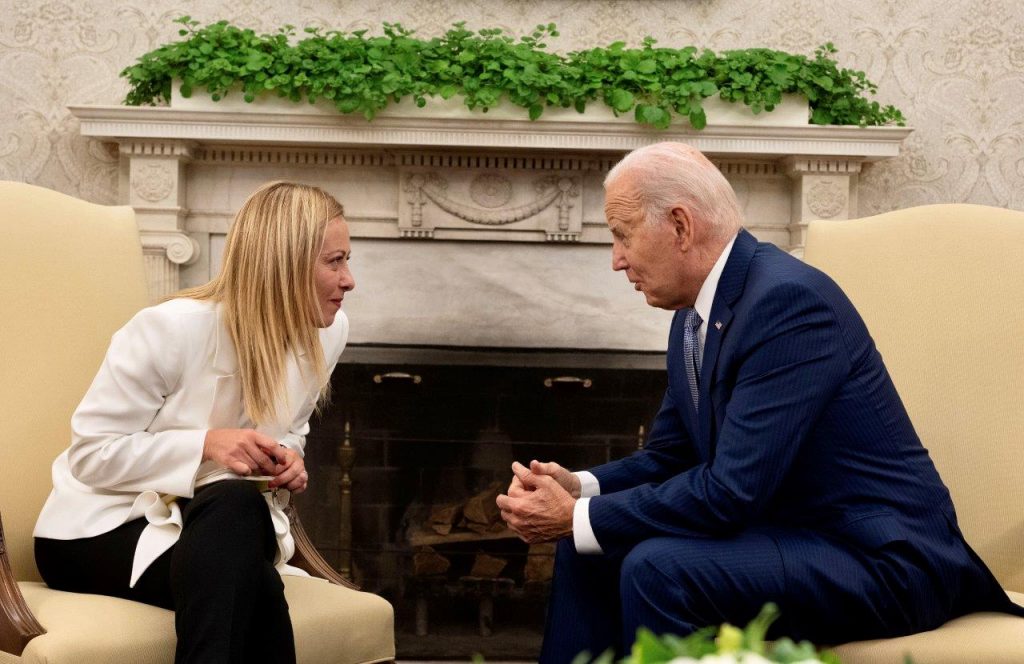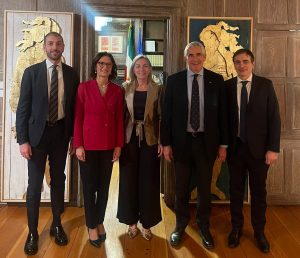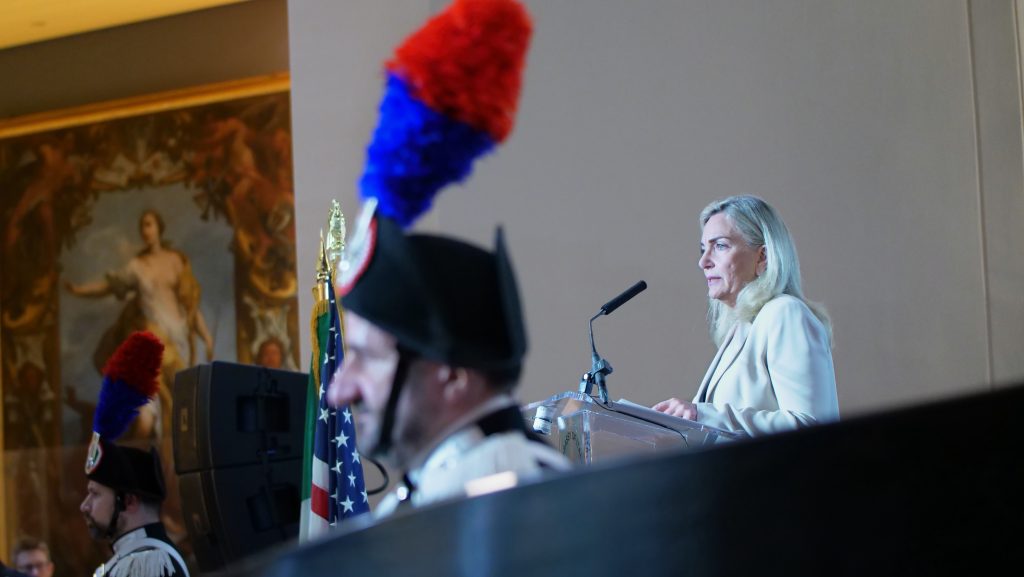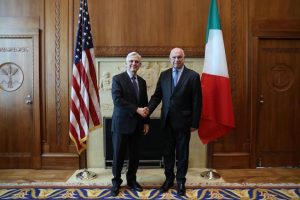Today, the President of the United States, Joseph R. Biden, and the President of the Council of Ministers of the Italian Republic, Giorgia Meloni, met at the White House. They reaffirmed the unshakable alliance, strategic partnership, and deep friendship between the United States and Italy. The ties between Italy and the United States are rooted in history, cultural affinity, and economic cooperation. They are founded on our shared values and principles – democracy, freedom, respect for human rights – reinforced by the shared objective to promote peace and security, enhance prosperity, and advance sustainability all around the globe. The connections between our people are at the heart of this relationship. Both leaders highlighted the important role of the Italian-American community, whose contributions make the United States stronger, more prosperous, and more vibrant. Prime Minister Meloni also affirmed the key contributions of Italian communities abroad.

President Biden and Prime Minister Meloni both affirm that the NATO Summit in Vilnius demonstrated the unity and the strength of the transatlantic bond, and the Alliance’s unique capacity to adapt its deterrence and defense posture to address challenges from all strategic directions, including NATO’s Southern Flank. Both leaders also stand with Ukraine as it defends itself from Russia’s illegal aggression. The United States and Italy will continue to provide political, military, financial, and humanitarian assistance to Ukraine for as long as it takes, with the aim to reach a just and lasting peace that fully respects the UN Charter and Ukraine’s sovereignty and territorial integrity. The United States and Italy also recognize the need to address the global consequences of the conflict, especially on vulnerable countries’ stability, energy, and food security. They reaffirm the importance of enabling Ukraine to export food via the Black Sea and condemn Russia’s unilateral withdrawal from the Black Sea Grain Initiative, which has been instrumental in reducing world food prices, and its attacks on Ukrainian grain storage and transport infrastructure. They welcome the progress on food systems transformation reported at the Stocktaking Moment of the UN Food Systems Summit held in Rome on 24-26 July. Both sides also commit to further coordination on Ukraine’s reconstruction and recognized the role Italy will play in this effort, with Italy’s presidency of the G7 in 2024 and hosting of the Ukraine Reconstruction Conference in 2025.
The United States and Italy note the vital importance of shared efforts to promote stability and prosperity in the wider Mediterranean region, including by addressing the root causes of instability, terrorism, and irregular migration flows. The United States and Italy affirm their support for the Tunisian people as Tunisia endures continued economic and political challenges. The United States and Italy also affirm their shared desire for a prosperous, secure, and democratic Tunisia. The United States welcomed the Conference on Migration and Development held on July 23 in Rome, as well as the establishment of the “Rome Process” to promote partnerships between countries of origin, transit, and destination of migration in the broader Mediterranean region, the Middle East and Africa. In this framework, the United States takes note of the Italian government’s “Mattei Plan” for Africa.
The United States and Italy reaffirm their shared commitment to the security, stability, and prosperity of the Western Balkans and their longstanding support for the region’s Euro-Atlantic integration. They determined to reinforce coordination to favor de-escalation and reconciliation and acknowledged the crucial role of the Quint. The United States welcomes the Italian government’s commitment in the Western Balkans, including through the contribution of the Italian armed forces to KFOR, EULEX, and EUFOR Althea missions.
The United States and Italy are firmly committed to a free, open, prosperous, inclusive, and secure Indo-Pacific. The United States welcomes the increased presence of Italy in the region. The two sides reiterate the vital importance of maintaining peace and stability across the Taiwan Strait, which is instrumental to regional and global security and prosperity. The United States and Italy also commit to strengthen bilateral and multilateral consultations on the opportunities and challenges posed by the People’s Republic of China.
The United States and Italy pledge to continue coordination, including within multilateral fora, on issues to advance global prosperity, inclusive growth, and peace and security. The United States looks forward to Italy’s leadership of the G7 in 2024, where the G7 will increase efforts to accelerate the clean energy transition, and tackle pressing global challenges, including the climate crisis, poverty, food insecurity, economic security, critical mineral supplies, and migration, further engaging in dialogue and cooperation on all these issues with developing countries, and especially with African countries. The leaders are united in their commitment to raise the level of ambition and commitment to supporting developing counties hard hit by multiple crises and to accelerating progress towards the Sustainable Development Goals (SDGs).
President Biden and Prime Minister Meloni committed to advance work to evolve the multilateral development banks to make them more responsive to shared global challenges like climate change, pandemics, and conflict and fragility, including through implementation of critical financial reforms begun under Italy’s leadership in the G20 and a review of the climate finance architecture to make it more effective and efficient. In parallel, the leaders committed to work together toward a successful IDA 21 next year. The leaders also discussed ways to explore mobilizing more headroom and concessional finance to boost the World Bank’s capacity to support countries addressing global challenges and provide strong support for the poorest countries.
The United States welcomes the participation of Italy in the Minerals Security Partnership and its intention to join the steering committee of the Blue Dot Network. Both sides also stress their support for the G7 Partnership for Global Infrastructure and Investment. Italy also confirms that the Italian Presidency of the G7 will support the Global Coalition to address synthetic drug threats. The United States also welcomes Italy’s bid to host the World Expo in 2030, acknowledging the opportunity of using the Expo as an inclusive platform to find shared solutions to common challenges.
The United States and Italy share a mutual intent to enhance relations with Africa on the basis of a partnership among equals, and note the importance of mobilizing the private sector, our UN partners, multilateral development banks, and international financial institutions in support of these efforts. Both countries also renew the commitment to promote effective policies to fight terrorism in the framework of the D-ISIS Coalition.
The United States and Italy share a focus on the role of emerging technologies in shaping the global economy and influencing the future of the international system in the coming decades. Both sides recognize cybersecurity as a key component of resilience that enables societies to reap the benefits of industrial and technological cooperation and development. The United States and Italy commit to deepen bilateral and multilateral collaboration in these domains, along with intensified focus on the impact of artificial intelligence, including under Italy’s Presidency of the G7 next year. Both sides welcome the Counter Ransomware Initiative and international coordination efforts, including the “NATO Cyber Pledge Conference” in Rome.
The United States and Italy recognize that economic resilience requires de-risking, diversifying, and reducing excessive dependencies to build resilient and secure supply chains. Both sides underline the importance of strengthening transatlantic economic cooperation, including through the U.S.-EU Trade and Technology Council and the U.S.-EU Energy Council, to improve security, cooperate to secure energy supplies and avoid fossil fuel dependencies, continue to secure supplies of critical minerals, and ensure that technologies work for – not against – democracies, and create opportunities for growth, jobs, and public welfare. The United States and Italy both reaffirm their commitment to continue the momentum from the G7 Hiroshima Summit related to strengthening economic resilience and economic security, including efforts under the G7 Coordination Platform on Economic Coercion to increase our collective assessment, preparedness, deterrence and response to economic coercion.
Free and fair trade remains a fundamental tool to foster the balanced growth of the global economy and to benefit our people. U.S.-Italy bilateral trade, amounting to $117 billion in 2022 and steadily growing, is a pillar of this expanding partnership. Bilateral investment between the United States and Italy supports hundreds of thousands of jobs across both countries. The United States and Italy commit to strengthen the economic partnership by increasing cooperation, co-investments, workforce development, and friend-shoring across different strategic sectors that will define not only the present, but our common future, including on emerging technologies, the clean energy transition, and the defense sector. The sides also commit to intensify bilateral judicial cooperation, in line with ongoing joint efforts to promote the rule of law and counter international organized crime, including human trafficking.
Both President Biden and Prime Minister Meloni affirm the existential threat posed by climate change and their commitment to taking decisive actions this decade to keep within reach their shared goal of limiting the global average temperature rise to 1.5 degrees Celsius. Both recall the valuable contribution of the Net-Zero Government Initiative, launched by the United States and joined by Italy, inviting governments to lead by example and achieve net-zero emissions from national government operations by no later than 2050. The United States and Italy share an interest in working together to address emissions in developing countries, including methane. The two countries plan to continue enhanced cooperation and alignment on timely solutions towards achieving shared climate goals and an ambitious COP28 outcome, with the aim of ensuring social, economic and environmental sustainability.
The United States and Italy commit to strengthen space cooperation, including through the creation of a “new space dialogue” to promote industrial cooperation with government support. Both reaffirm their partnership on space exploration and express, as original signatories, support for the principles of the Artemis Accords. The United States and Italy recognize the importance of addressing space threats through norms, rules, and principles of responsible behaviors, and welcome innovative new commercial space partnerships, including to advance human spaceflight. Both sides look to encourage further space-related investments, and industrial collaboration, including on commercial space stations.
The leaders also commit to strengthen bilateral collaboration in science and technology research and development, anchored in values of democracy, equity, fair competition, freedom of inquiry, openness, research integrity and transparency. Both sides confirm their shared objective to foster high quality and equitable education, including through partnerships between respective high schools and universities and arrangements for joint or double degrees. Initiatives to promote the study of languages and cultures and broader people-to-people exchanges are especially important in this approach, including the flagship U.S.-Italy Fulbright Program, which celebrates its 75th anniversary in 2023. Both countries intend to develop new ways to enhance high level research and exchanges, including through the Italian Academy for Advanced Studies in America. The United States and Italy also commit to continue working together to protect and preserve cultural heritage, including within the framework of the U.S.-Italy bilateral cultural heritage agreement.





